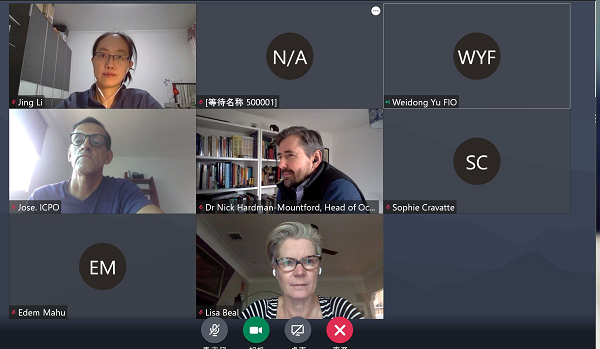7th Organising Committee Telecon for the CLIVAR-GOOS Workshop

The 7th Organising Committee telecon for CLIVAR-GOOS workshop was organized on January 20, 2022, with the participation of Weidong Yu (Co-chair, OOPC), Edem Mahu (Co-chair, invited), Lisa Beal (OOPC), Nick Hardman Mountford (IORP), Enrique Curchister (OMDP), Sophie Cravatte (PRP), Ivonne Montes (PRP), and Jose and Jing Li from ICPO. The meeting continued the discussion of the workshop agenda, with a focus on Day 2 (Connect observation-modeling-prediction) and Day 3 (Multi-disciplinary and innovative observing system and expansion into coastal zones), based on the initial ideas prepared by Weidong. A basic structure of the agenda was developed by the end of the telecon. Major uptakes from the discussions include:
- Many candidate speakers from developing rim countries for Day 1 have been identified by the organizing committee members, and the list will remain open to invite more inputs from the committee. Speakers for the plenary talks can be invited ASAP.
- The programmes for Day 2 and Day 3 are now in good shape. It was anticipated that some concrete actions and pilot projects can be developed by the end of the workshop.
- Rather than introducing the most advanced and fancy observing equipment and modeling products in the world which are not fully accessible by the developing countries, the workshop should be more focused on the read-to-use technologies and products (e.g. ROMS, satellite observation and low cost tools and sensors), which can be used easily by developing rim countries to solve their real problems. Meanwhile, we can also invite developing rim countries to introduce their local sensors and see how we could help improve them.
- To bring in new partners from resources/philanthropy organisations, and connect them with the countries and regions that need them.
- An open call for abstracts for flash talks will be prepared and open in February. It is to be broadly advertised through different channels.
- There will be a possibility that the workshop may go 100% online in 2022 if the pandemics continues and thus impedes the participation in particular from developing rim countries, whom we are really targeting to. The workshop has already been postponed for two years, and should not be continuously delayed on the excuse of pandemics. A face-to-face meeting could still be organized when it is possible, picking up the outcomes from online meeting and discussions, and moving forward to the next level to build more partnerships. Effective online sessions, particularly for the breakout sessions will require well-designed agenda and clear objectives, good facilitators and technical support.
- To link the workshop more closely with the UN Ocean Decade, e.g. with the Ocean Observing Co-design programme as well as the UN Ocean Conference.











Add new comment